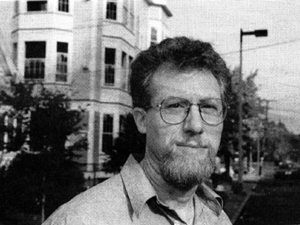Professor Michael Stone of the College of Public and Community Service, the McCormack Institute of Public Affairs, and the Public Policy Ph.D. Program was recently named a recipient of a 2002 Atlantic Fellowship. He is one of only nine public policy professionals in the United States chosen this year and is the first member of the UMass Boston faculty to ever receive the prestigious award.
Established by the British Foreign and Commonwealth Office in 1994 to commemorate the fiftieth anniversary of D-Day and the U.S. contribution to the liberation of Europe, the Atlantic Fellowship in Public Policy provides a unique opportunity for outstanding mid-career professionals to study in the United Kingdom.
As an Atlantic Fellow, Stone will be spending the 2002-03 academic year based at the Centre for Urban and Community Research at Goldsmiths College, University of London. His Atlantic Fellowship project is titled “Shelter Poverty and Social Housing in the U.K. and U.S.: Action Research for Policy and Practice.”
A primary focus of Stone’s research and professional activity in the United States has been on the problem of housing affordability, as defined and measured through his original concept of “shelter poverty.”
The shelter poverty standard is a sliding scale of housing affordability that reflects the interaction among incomes, housing costs and the basic costs of non-shelter necessities. Both nationally and locally, Stone’s studies of shelter poverty have not only examined the problem in the aggregate, but also given particular attention to shelter poverty among households headed by persons of color, women and the elderly.
Since his book Shelter Poverty: New Ideas On Housing Affordability was published in 1993, Stone has continued to update his analysis. A forthcoming book co-edited by Stone, Housing: Foundation for a New Social Agenda, includes a chapter that examines shelter poverty trends nationally from 1970 through the late 1990s. He has also conducted a series of studies on shelter poverty in Massachusetts.
Now that he has been selected as an Atlantic Fellow, Stone has the opportunity to introduce this concept to British policymakers, practitioners, academics, and activists, and engage them in the process of evaluation, adapting, and re-computing the shelter poverty scale for the U.K. Stone will also be studying public and non-profit housing in the U.K., with emphasis on resident and community perspectives.
“The first purpose of the project is to apply and test the utility for the U.K. of the approach that I have developed for understanding housing problems in the U.S.,” said Stone. “The second purpose is to draw lessons for U.S. housing policy and community practice from the experience of the U.K.”
A third purpose, said Stone, is to identify and develop possibilities for ongoing collaborations between the Center for Social Policy and the other units of UMass Boston and the Centre for Urban and Community Research at Goldsmiths College.
Like UMass Boston, Goldsmiths is an integral part of a diverse urban setting, and the CUCR maintains a strong reputation for its socially relevant research on urban and community life, addressing popular, academic, policy and professional audiences.
“Goldsmiths has many parallels to things we’re doing here,” said Stone. “It is very much connected to the city. They do projects with the local community and draw many students from the local area.”
Stone hopes that his Atlantic Fellowship experience will provide a “special opportunity for ongoing contact, joint research projects and perhaps distance learning and teleconferencing.”
For more than 30 years, Stone has been involved in research, policy analysis, program development, technical assistance, and advocacy on housing, living standards and participatory planning.

